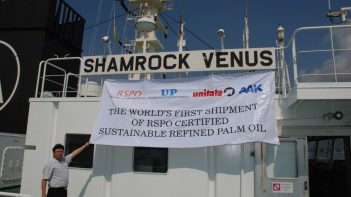A key RSPO objective – the conversion of 100 per cent of the market to sustainable palm oil – moved a step closer with the announcement that demand for the sustainable oil is rising faster than supply for the first time. Fresh RSPO data reveal a new record high in sales of certified sustainable palm oil (CSPO) for the first half of 2014, helping narrow the historic gap between CSPO production and demand.
Sales of physical CSPO, reported in the eTrace system through Identity Preserved (IP), Segregated (SG) and Mass Balance (MB) supply chains, have grown by an unprecedented 64.7 per cent during the first two quarters of this year (Q1 & Q2 2014) compared to the same period last year, reaching 1,117,042 Metric Tonnes (MT). Meanwhile, sales of GreenPalm Certificates have grown by 37.9 per cent, reaching 1,361,396 MT.
RSPO Secretary General Darrel Webber commented: “This is good news for certified growers who will now get more return on investment for their sustainable practices. The key to making the whole palm oil industry sustainable is to share responsibility between palm oil producer and consumer markets.
Total CSPO sales, including both physical CSPO and GreenPalm Certificates, have grown by 48.8 per cent, reaching record 2,478,438 MT. Total CSPO production stood at 5,276,064 MT at the end of June 2014.
This is the first time that CSPO sales have grown faster than supply, which increased by 29 per cent over the first two quarters of 2014 compared with the same period last year.
The low level of CSPO uptake has been a long-standing challenge for RSPO and its members and remains a major source of concern. At its recent European Roundtable event in London, entitled 100% CSPO: Our Shared Responsibility (4 June 2014), RSPO called on its supply chain members to support certified growers by purchasing more CSPO.
The rapid growth of Q1-Q2 2014 sales has helped bring the market uptake level to 47 per cent, six points higher than in the same period last year. Europe represents the major CSPO buyer worldwide.
Danielle Morley, RSPO European Director of outreach and engagement, added: “Europe has been a leading market in CSPO purchases for a while and we also see some growth in new markets, namely US, Australia, China, which confirms a rising global industry trend towards 100% sustainable palm oil.
NOTES TO EDITOR
Key CSPO figures
|
|
CSPO Sales |
CSPO |
||||
|
|
GP |
UTZ |
Total |
Supply |
Sales |
Uptake |
|
2014 Jan-June |
1,361,396 |
1,117,042 |
2,478,438 |
5,276,064 |
2,478,438 |
47% |
|
2013 Jan-June |
987,310 |
678,181 |
1,665,491 |
4,089,458 |
1,665,491 |
41% |
|
Growth % |
37.9% |
64.7% |
48.8% |
29.0% |
48.8% |
|
18% of world's palm oil production is now RSPO certified
The current estimated annual production capacity of RSPO-certified sustainable palm oil is 11.1 million metric tons, approximately 18% of global crude palm oil. Spread over 1.98 million hectares of certified production area, about 49.6% of the world's current RSPO-certified sustainable palm oil production capacity comes from Indonesia, followed by 40.6% from Malaysia, 5.6% from Papua New Guinea and the remaining 4.2% from Solomon Islands, Ivory Coast, Thailand, Guatemala, Ecuador, Brazil, Cambodia and Colombia.
About RSPO
In response to the urgent and pressing global call for sustainably-produced palm oil, the Roundtable on Sustainable Palm Oil (RSPO) was formed in 2004 with the objective of promoting the growth and use of sustainable oil palm products through credible global standards and engagement of stakeholders. The seat of the association is in Zurich, Switzerland, while the secretariat is currently based in Kuala Lumpur with satellite offices in Jakarta and London.
RSPO is a not-for-profit association that unites stakeholders from seven sectors of the palm oil industry – oil palm producers, palm oil processors or traders, consumer goods manufacturers, retailers, banks and investors, environmental or nature conservation NGOs and social or developmental NGOs – to develop and implement global standards for sustainable palm oil.
Such multi-stakeholder representation is mirrored in the governance structure of RSPO such that seats in the Executive Board and project-level Working Groups are fairly allocated to each sector. In this way, RSPO lives out the philosophy of the "roundtable" by giving equal rights to each stakeholder group to bring group-specific agendas to the roundtable, facilitating traditionally adversarial stakeholders and business competitors to work together towards a common objective and make decisions by consensus.
Contact for RSPO Secretariat:
Danielle Morley
RSPO European Director of Outreach and Engagement
T: +44 (0)208 282 6069
M: +44 7779 780 737
Twitter: @danimorle
Stefano Savi
RSPO Acting Communications Director
T: +603-2302 1500 ext 101
About e-Trace
In November 2007 RSPO contracted UTZ Certified as its provider for traceability services, related to the supply chain of RSPO Certified Palm Oil. A web-based IT system, called E-Trace, developed and serviced by UTZ Certified allows RSPO and its members to follow and report on the uptake of CSPO in the global market place. The data in the system are registered by parties in the palm oil supply chain, who log all their physical trading activities in the system.
For further information about UTZ Certified:
Email: [email protected]
NOTE:
As of 1 January 2017, the RSPO no longer endorses GreenPalm as the service provider for the trade in Book and Claim certificates. From this date, RSPO-certified volumes can be sold via Credits on the RSPO PalmTrace platform.
Keep reading

RSPO hosts first Africa downstream sustainable palm oil supply chain forum in Cape Town

Nearly two decades on, Europe continues to drive global demand for RSPO Certified Palm Oil

Communicating Sustainable Palm Oil - examples of success across Europe
[EOT] Terms of Reference: Independent Smallholders Outreach Programme in Indonesia

RT2023 Delegates Propose Solutions to Reinforce RSPO’s Assurance System – End-Year Highlights of Assurance Standing Committee
RSPO UK Members' Day Examines Shifting Dynamics of Doing Business within Europe

Celebrating 20 Years of RSPO’s Sustainability Journey




